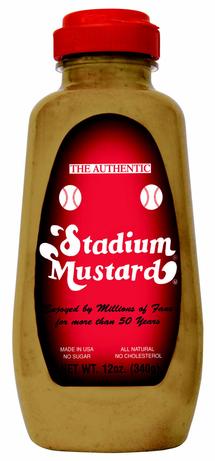Stadium Mustard
Stadium Mustard[edit | edit source]
Stadium Mustard is a type of mustard that is particularly popular in the United States, especially in the Midwest region. It is known for its unique flavor, which is spicier and more robust than traditional yellow mustard. Stadium Mustard is often associated with sports events, particularly baseball and football, where it is commonly served as a condiment for hot dogs, pretzels, and other stadium foods.
History[edit | edit source]
Stadium Mustard was first introduced in the 1960s in Cleveland, Ohio. It quickly gained popularity due to its distinctive taste and became a staple at Cleveland Stadium, where it was served to fans attending Cleveland Indians and Cleveland Browns games. The mustard's reputation spread, and it became a sought-after condiment at various sports venues across the country.
Characteristics[edit | edit source]
Stadium Mustard is made from a blend of brown mustard seeds, vinegar, and spices. Unlike traditional yellow mustard, which is made from yellow mustard seeds, Stadium Mustard's use of brown seeds gives it a darker color and a more intense flavor. It is often described as having a "zesty" or "tangy" taste, with a smooth texture that complements a variety of foods.
Culinary Uses[edit | edit source]
Stadium Mustard is most commonly used as a condiment for hot dogs and sausages, but it is also popular on sandwiches, burgers, and soft pretzels. Its bold flavor makes it a versatile ingredient in marinades, salad dressings, and dips. Some chefs incorporate Stadium Mustard into barbecue sauces and glazes for meats.
Cultural Significance[edit | edit source]
In the Midwest, Stadium Mustard is more than just a condiment; it is a part of the regional culinary heritage. It is often mentioned in discussions about regional foods and is a source of pride for many locals. The mustard has a loyal following, and fans often purchase it to use at home, bringing a taste of the stadium experience to their own kitchens.
Related pages[edit | edit source]
Search WikiMD
Ad.Tired of being Overweight? Try W8MD's physician weight loss program.
Semaglutide (Ozempic / Wegovy and Tirzepatide (Mounjaro / Zepbound) available.
Advertise on WikiMD
|
WikiMD's Wellness Encyclopedia |
| Let Food Be Thy Medicine Medicine Thy Food - Hippocrates |
Translate this page: - East Asian
中文,
日本,
한국어,
South Asian
हिन्दी,
தமிழ்,
తెలుగు,
Urdu,
ಕನ್ನಡ,
Southeast Asian
Indonesian,
Vietnamese,
Thai,
မြန်မာဘာသာ,
বাংলা
European
español,
Deutsch,
français,
Greek,
português do Brasil,
polski,
română,
русский,
Nederlands,
norsk,
svenska,
suomi,
Italian
Middle Eastern & African
عربى,
Turkish,
Persian,
Hebrew,
Afrikaans,
isiZulu,
Kiswahili,
Other
Bulgarian,
Hungarian,
Czech,
Swedish,
മലയാളം,
मराठी,
ਪੰਜਾਬੀ,
ગુજરાતી,
Portuguese,
Ukrainian
Medical Disclaimer: WikiMD is not a substitute for professional medical advice. The information on WikiMD is provided as an information resource only, may be incorrect, outdated or misleading, and is not to be used or relied on for any diagnostic or treatment purposes. Please consult your health care provider before making any healthcare decisions or for guidance about a specific medical condition. WikiMD expressly disclaims responsibility, and shall have no liability, for any damages, loss, injury, or liability whatsoever suffered as a result of your reliance on the information contained in this site. By visiting this site you agree to the foregoing terms and conditions, which may from time to time be changed or supplemented by WikiMD. If you do not agree to the foregoing terms and conditions, you should not enter or use this site. See full disclaimer.
Credits:Most images are courtesy of Wikimedia commons, and templates, categories Wikipedia, licensed under CC BY SA or similar.
Contributors: Prab R. Tumpati, MD

